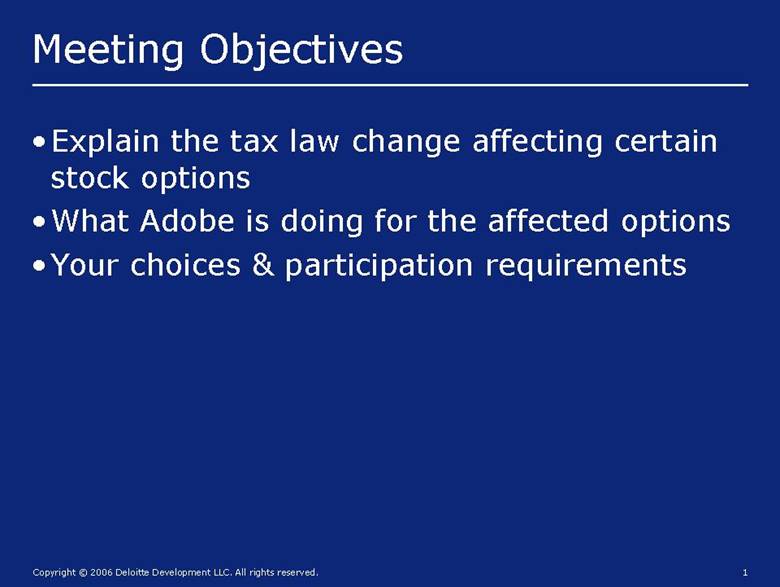Rule 409a stock options
It is not uncommon for a closely-held business to provide an economic incentive to its key employee. Often, the incentive takes the form of an annual cash bonus. Alternatively, the business may provide the key employee with a longer-term incentive, in the form of a deferred compensation arrangement that may be payable on retirement or upon the sale of the business.
In other situations, the key employee may be granted an equity interest in the business, or the right to purchase such an interest. In each of these scenarios, both the employer and the employee must pay close attention to the rules and principles that govern the income tax treatment of the compensation arrangement.
Only by doing so can the employee avoid being taxed prematurely on i. Where the incentive granted is an option to purchase equity in the business, the parties must be especially aware of IRC Sec. A recent IRS advisory reviewed the income tax consequences of one equity-based compensation arrangement. These two tax years were closed at the time the IRS examined Year 3.

Employee was not required to pay any additional amount in exchange for grant of Option. Under the terms of the option agreement, a certain number of Option Shares would vest each year following the grant date.
The vested Option Shares could then be exercised at any time during a specified number of years from the vesting date. Employee became vested in a number of Option Shares in Year 2 and in Year 3, and exercised Option as to these shares.
Conversely, if the exercise price is less than such FMV, the option is treated as a nonqualified deferred compensation plan subject to section A that must meet the time and form of payment requirements under the section A regulations. A nonqualified deferred compensation plan subject to section A a must provide, upon adoption of the plan, for a deferred amount to be paid at a time and in a form meeting the section A time and form of payment requirements.
To satisfy the time and form of payment requirements, the plan must designate that a specified nondiscretionary and objectively determinable deferred amount may be paid only upon a specified or the earlier or later of certain specified permissible payment event or events , such as a specified time or date, death, disability, separation from service, or a change in control event, or a permissible period following the applicable payment event.
For purposes of determining the FMV of employer stock underlying an NSO intended to be exempt from section A, the regulations provide that, for stock that is readily tradable on an established securities market, the FMV of the stock on the grant date of the option is determined based on a reasonable method using actual transactions in the stock as reported by the established securities market.
Straight Talk on Sec. 409A Valuations: Getting It Right the First TimeThe regulations further provide that, for employer stock that is not readily tradable on an established securities market, the FMV of the stock on the grant date of an NSO is determined based on the reasonable application of a reasonable valuation method, taking into consideration events occurring after the date of the calculation that may materially affect the value of the employer stock.
Therefore, the stock underlying the NSO was treated for purposes of section A as having been readily tradable on an established securities market on the grant date of Option.
What is Section A?
As a result, the Option did not meet the regulatory requirements for exemption from section A. Thus, the Option was treated as a nonqualified deferred compensation plan subject to section A from the grant date until the end of the taxable year during which the Option was either fully exercised or expired. Because the Agreement generally provided that Option Shares could be purchased through Option exercise at any time following vesting, the Option terms did not designate a permissible payment event as the only time that Option Shares could be purchased.
Therefore, Option failed to meet the requirements of Section A from the grant date.
A Nonqualified Deferred Compensation Plans
MENU Home Authors Resources Subscribe Contact Search… Search. Posted in Federal Tax Issues. Incentive Compensation It is not uncommon for a closely-held business to provide an economic incentive to its key employee.
Establishing fair market value for purposes of Section A and stock option grants | The Venture Alley
The Options At Issue A recent IRS advisory reviewed the income tax consequences of one equity-based compensation arrangement.
Check in tomorrow for a discussion of the income tax consequences arising from this failure. Tweet Like Email LinkedIn Google Plus. Kasnicki Joseph La Ferlita Lou Vlahos. Privacy Policy Disclaimer RSS LinkedIn.